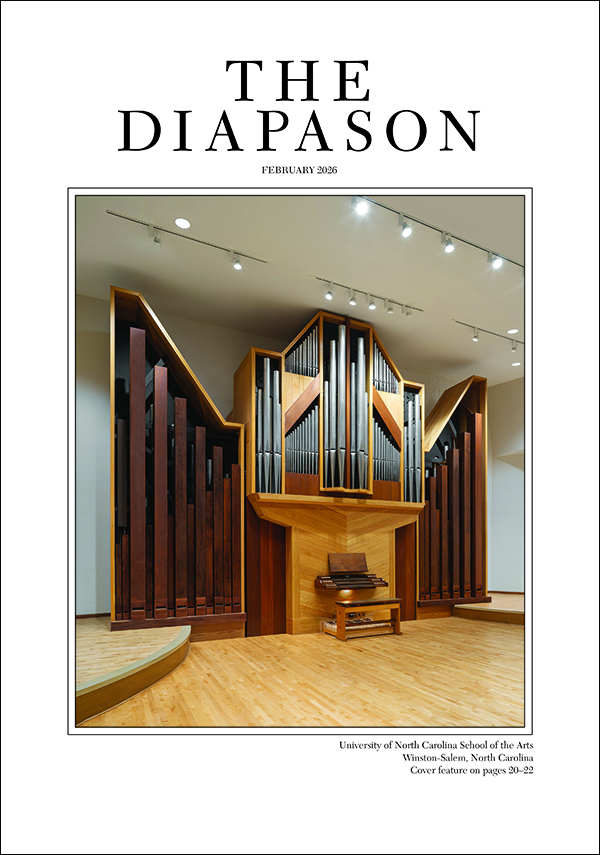
Remembering George Lucktenberg (1930–2014)
Artist Walt Kuhn’s serious but jaunty painting of a horse jockey graced a color postcard from George Lucktenberg, received in Dallas on October 26. Morose information overflowed the small space for writing on the reverse side of the card: sad news of the suicide of a mutual friend. George continued with several lines about his own deteriorating health: “MY news isn’t quite THAT bad, but I AM in less-good shape than before . . .” Later the same day, while I sat at my computer trying to formulate some comforting words as a response, an e-mail arrived from harpsichord maker Richard Kingston with the shocking report of George’s massive heart attack and death that very day.
A person who contributed a great deal to the growth of an American harpsichord culture in our time, Dr. Lucktenberg was indeed a man of many talents. We first met during my Virginia years (1963–70) when he and his violinist wife Jerrie Cadek Lucktenberg stopped the charmingly labelled “Harpsi-cart” in Norfolk during one of their many tours as a violin-harpsichord duo. George “looked me up” since we both owned German instruments from the Passau factory of Kurt Sperrhake. In 1969 George returned alone to marvel at my new William Dowd harpsichord, which he told me was his first experience with an instrument constructed in a historically accurate style. George soon joined the swelling ranks of advocates for these ear-opening instruments.
After my move to Texas, there was another memorable encounter with George during the second harpsichord weekend organized by Bruce Gustafson and Arthur Lawrence at St. Mary’s College in Indiana (1979). A walk together back to the motel after an evening program gave opportunity for George to float the idea of organizing an early keyboard society. I, being inherently shy of organizations as time-consuming distractions from writing and practicing, suggested that perhaps the American Guild of Organists was already enough, and we interested players should try to include more harpsichord information within the context of programs presented by that august body.
Obviously not sharing my reluctance, George returned to Converse College in Spartanburg, South Carolina (where he served on the faculty from 1960 until 1990), and within a few years he became the founding president of a new group: the Southeastern Historical Keyboard Society (1980). An offshoot of this organization was the founding of Aliénor: a privately funded interest group promoting the creation of contemporary repertoire for the harpsichord. It probably comes as no surprise that George was its first executive director. Happily, if not surprisingly, both groups have flourished —sometimes together, sometimes separately. Currently both are included in the recently formed Historical Keyboard Society of North America, whose fourth annual conclave will take place May 21–24, 2015, in Montreal, and is scheduled to include the most recent iteration of Aliénor’s harpsichord-composition competition as the culminating event of the meeting.
Following retirement from Converse, George and his instruments moved to Georgia, where he taught in Atlanta and served as artist-in-residence at Reinhardt College in Waleska. There he was genial host to the annual meeting of his own offspring organization, SEHKS, a meeting made memorable by the incredible artistry of the jazz-harpsichordist Don Angle. Incidentally, George was very proud of the double meaning that occurred in his society’s acronym. At Reinhardt, Dr. Lucktenberg remained musically active, presenting his final public concert on February 17, 2013, in the college’s Falany Performing Arts Center.
There was so much more to George’s legacy than successful organizing and artistic performing, not the least of which included his 52 summers of teaching eager young students at the Interlochen Arts Academy in Michigan. Among his printed contributions are volumes of early music, editions of contemporary works, and, as a result of his many trips across the Atlantic Ocean to visit historic instruments, a 1997 Indiana University Press book, Early Keyboard Instruments in European Museums, co-authored with University of Iowa musicologist and harpsichord builder Ed Kottick. From the preface to this volume:
. . . The more I found out about historical keyboard instruments, the more I wanted to know. A delightful discovery was the extent to which a similar passion existed in kindred spirits; a thirst for firsthand knowledge and a professorial compulsion to share it with others led to the Lucktenberg Historical Keyboard Tours of Europe. On all but my earliest ventures I have been ably abetted and seconded by my esteemed colleague Edward Kottick, whose amiable presence and broad knowledge soon made him indispensable to the endeavor.
My own copy of this useful book came to me from the personal library of another departed friend, the noted scholar of early keyboards Dr. Martha Clinkscale. When I retrieved the volume from my overstocked bookshelves, I found, inside its cover, a gracious note from George to Martha, thanking her for her helpful reading of the original manuscript. Included as well were Martha’s penciled jottings of possible corrections and some linguistic suggestions. Many years ago, another treasured colleague, Dr. Betty Louise Lumby, assured me that each departed friend leaves us a gift if only we are acute enough to realize what it is! I hope that George and Martha will let me know what they have discovered about even more resonant keyboard instruments in the hereafter (thereby joining J. S. Bach and Claude-Bénigne Balbastre in correspondence with your Harpsichord Editor, who will, of course, share any such communications with our esteemed readers). But for now, I remain content with their substantial earthly contributions and keep in memory the warmth of their friendship.
Comments and news items are welcome. Please send them to Dr. Larry Palmer, Division of Music, Southern Methodist University, Dallas, TX 75275 [email protected].

